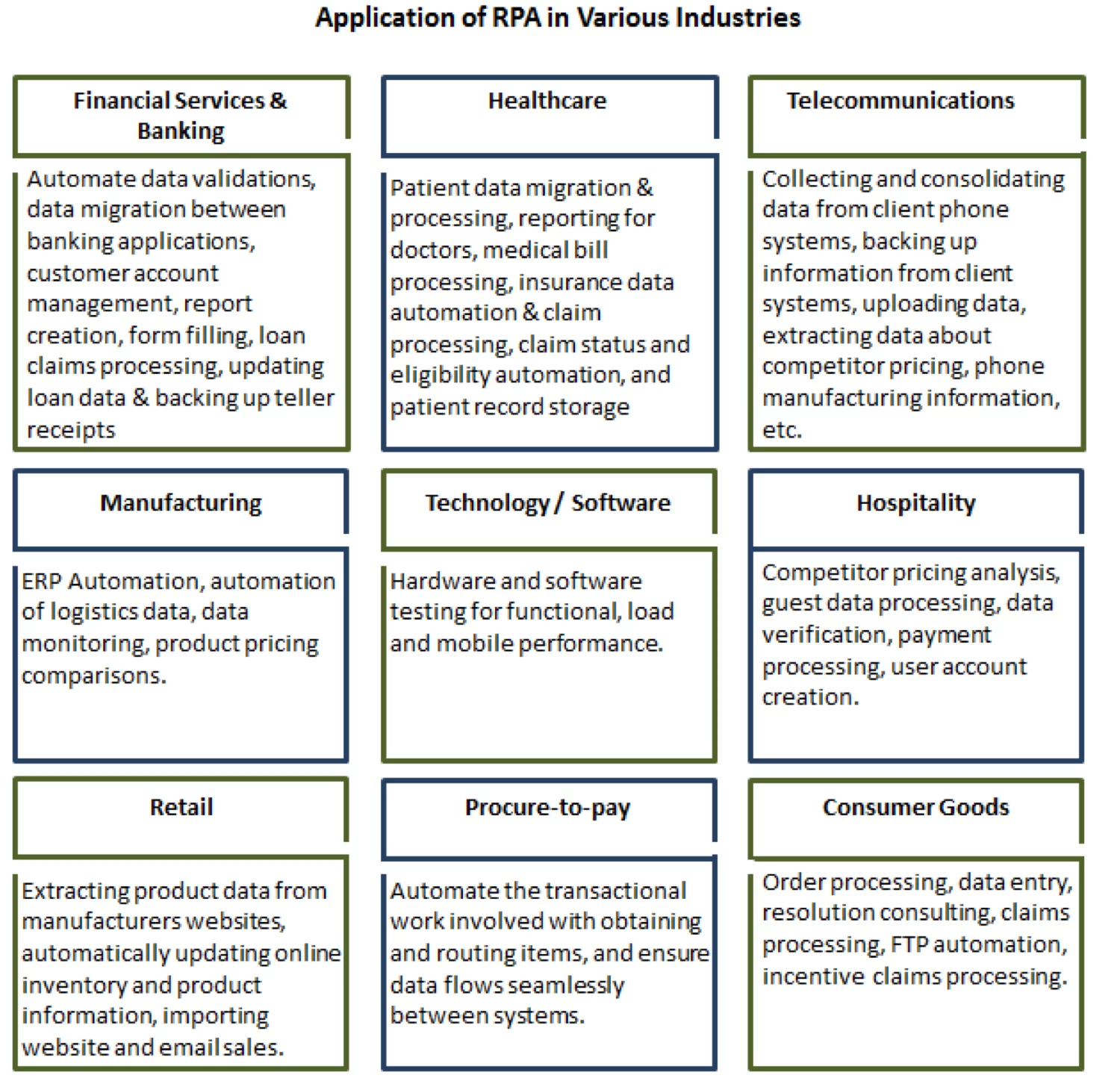The advances in technology are created with the sole purpose to improve the lives of human beings in every possible way. Businesses strive aggressively to bring innovation to their products and services by leveraging automation technologies to achieve augmented levels of customer experience.
Automation has been around for years and to serve the digital world it has been enhanced to bring one of the significant and super cool technologies we have now, that is, Robotic Process Automation (RPA).
RPA, combined with the conventional business solutions has stimulated digital transformation in each of the work spheres and industries it has stretched itself to. Enhancing business productivity, efficiencies, internal-external workflows, end-to-end business processes are all characteristics of an RPA-enabled system that undoubtedly sets a foundation for continuous improvement, growth, and expansion.


Image source : https://voicebot.ai
Uptake of robotic process automation can be seen industry-wide whether we talk about healthcare, automobiles, banking and finance, Information Technology, telecommunications, and many others.
To a surprise, many of us are only aware that RPA reduces operational costs and boosts production and efficiency; nonetheless, these are not only the biggest benefits of RPA to know. The list of advantages offered by RPA is quite long, diverse, and heterogeneous, let’s have a look:
Benefits to Reap Out of Robotic Process Automation
RPA has been backed by powerful Artificial Intelligence technology and together have played a great role in businesses concerning their primary motives of customer interaction, customer engagement, and end-user support.
While seeing one side of the benefits it’s imperative to check how the internal processes are made effective and efficient that render expected results of customer satisfaction.
#End of Human Errors and High Productivity
The first considerable advantage over this type of technology is that it allows companies to increase their growth capacity in the short term since both its implementation and its operation can be carried out immediately.
On the other hand, many times the reason companies are stunted is that they are not able to hire people fast enough; however, with the automation of processes, the training of a new robot occurs in just a few seconds.
Another great advantage is the increase in reliability, since the human error caused by the fatigue of a long day of work, among other reasons, is reduced to zero.
Missing fingerings and transcriptions are eliminated, the time to complete tasks is reduced to minutes or seconds, which translates into a higher quality of work, a significant reduction in operational costs, and a significant increase in production.
#Innovate, Collaborate, Create, and Interact
With RPA automation it is possible to accumulate information, process it, and make projections for the future better than humans can, but above all they can help automate administrative tasks and decisions to streamline workflows, making organizations more profitable, flexible, and responsive.
“If a task can be easily explained, it can be Automated.”
RPA is non-invasive and can be quickly deployed to accelerate digital transformation. The de-robotization of humans that RPA automation enables allows an organization’s employees to generate value to processes by focusing their working hours on the things they do best and enjoy the most: innovate, collaborate, create and interact with customers.
#Reduce Overheads and Minimize Risks
Certainly, when a company has a digital workforce in action, the processes and productivity are likely to get improved, be accurate, and flow consistently. With robots executing human tasks seem a risk to manual jobs, it is hard to believe that will they prove beneficial in the laborious task.
Well, yes, of course, while making machines more intelligent, more qualified, and smarter, humans are required to supervise a machine’s digital work. On one side if the RPA bots will replace humans taking repetitive and complex tasks, they will allow them to focus on more crucial tasks and will enable them to enhance their skills to take up other significant and quality jobs.
“Repetitive operations carried out by people tend to have the most errors. RPA reduces errors in these operations.”
Resultantly, when digital labor will take over hefty and complex tasks, the tendencies and possibilities of errors get negligible, thereby, minimizing risks at crucial work points and preventing the circumstances of rework.
The benefits that RPA automation can offer to the business world go beyond the replacement of the human workforce, today more than ever the creativity and ingenuity that only humans can contribute are needed.
Are You Ready to Start with RPA?
The creation and implementation of a digital workforce is an increasing trend where businesses haven’t shown any regrets on the applications of robotic process automation within their infrastructure.
With insightful decision making, robotic automation is been leveraged by a myriad of enterprises where resultantly, they have not only improved and grown financially but have acquired enhanced productivity and satisfaction levels at both employee and customer ends.
So give a start to Robotic Process Automation partnering with CodeGlo and see the difference in how digital bots pave the path of business success by expediting enterprise operations and revenue growth.







